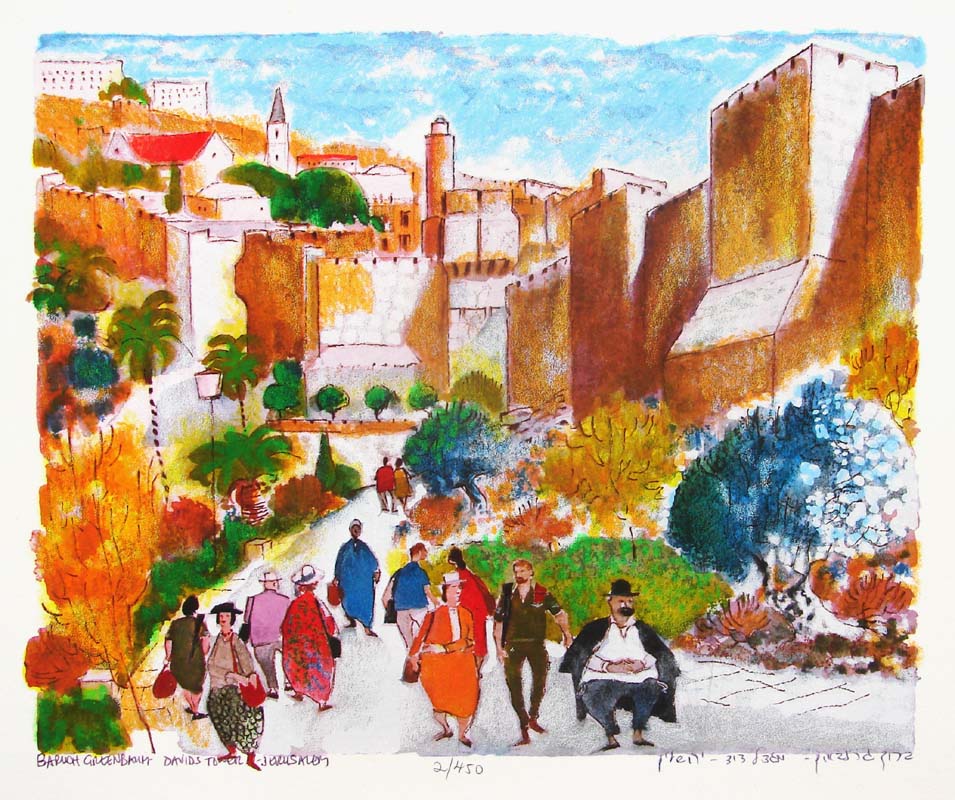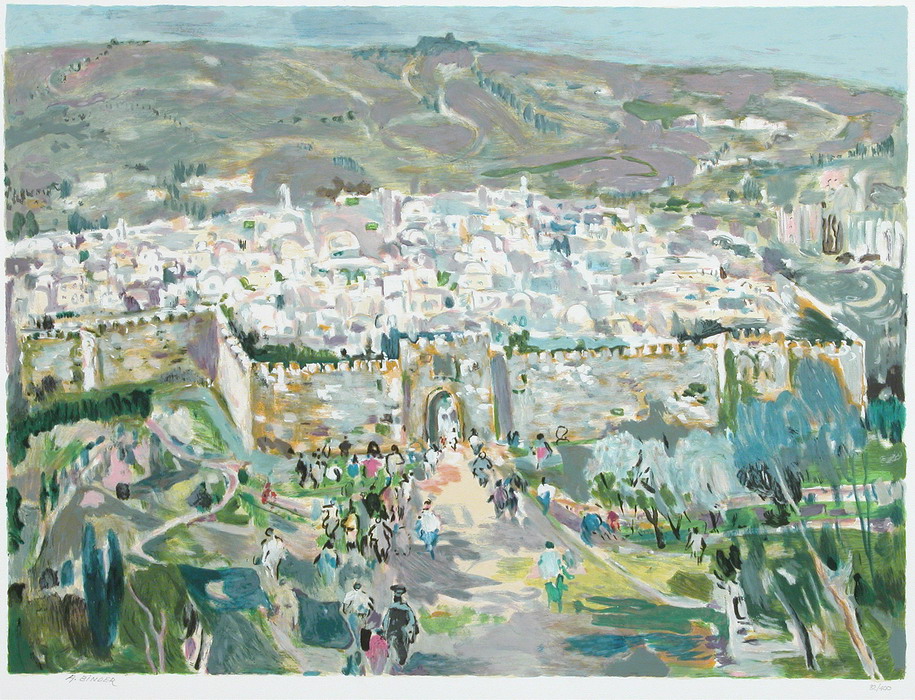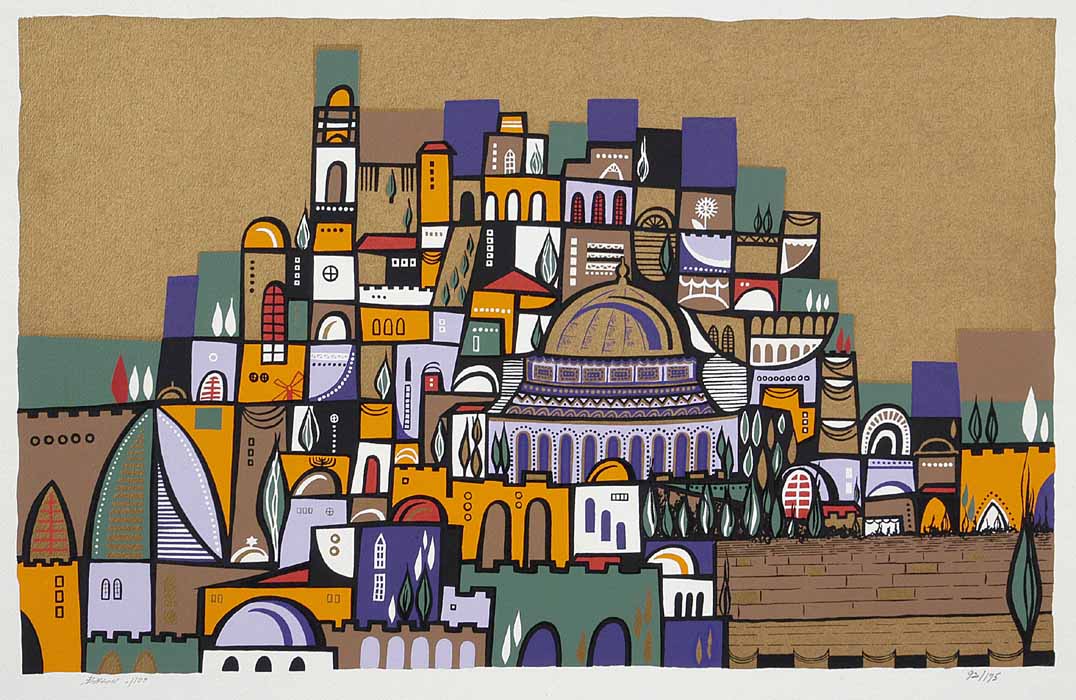
Greenbaum Baruch
David’s Tower
$125
19.75 inches wide X 13.75 inches high 50 cm wide X 35 cm high Lithograph 2012
Shipping & Handling: $30
BARUCH GREENBAUM
Baruch Greenbaum was born in Brighton, Sussex, England and studied at the Brighton College of Art.
He was one of the first freelance designers to work for B.B.C. Television. He studied painting with Bernard Meninsky.
Greenbaum served in the British 8th Army and was demobilized in 1946. He returned to London to study design. In 1950 he opened his illustration and design studio in Fleet Street.
Greenbaum worked continuously for the National Press, Advertising and Publishing. He emigrated in 1973 to Israel and lived and worked in Safed. He passed away in 1992.
Baruch Greenbaum’s landscapes of the Judean Hills and his more urban landscapes depicting life on the streets of Jerusalem are easily recognizable by their vibrant colors. Often using red, initially to delineate the scene, Greenbaum then overlays these almost sketchy lines with bright colors.
Greenbaum’s Jerusalem is one of verdant greens and warm yellows and oranges. Trees, streets, people and buildings – all are bright in the brilliant sunshine. Also, using artistic license to the full – or perhaps it is just wishful thinking on Greenbaum’s part – his Jerusalem is a relaxed, unhurried place where all different types of people belonging to many different faiths, stroll in leisurely fashion along traffic free streets – somewhat different to the noisy, fast moving reality of the modern city.
Greenbaum’s graphics and watercolors illustrate the concept of Jerusalem which many people hold in their minds and which has a separate entity to the city itself. It is Jerusalem as he would like it to be – and in fact Jerusalem as it is, without the extra layer of modernity – an ancient and spiritual city.

Binder Abraham
Jerusalem
$300
34.5 inches wide x 26.5 inches high 88 cm wide x 67 cm high Serigraph 1998 Edition 400
Shipping & Handling: $30
ABRAHAM BINDER – A GREAT MASTER
Particularly memorable are his urban landscapes with their predominance of blues and aquamarines, composed of a profusion of squares and rectangles, crowding one another and covering nearly the entire canvas. The angular shapes are interspersed with radiant dots of red, gold and yellow, like the lights of the big city.
Traces of these shapes are discernible in Binder’s work to this day, in the angularity of splashes of color which, no longer crowded together, are now well separated to create an airy spaciousness. Not only the splashes of color – the intervening space, too – creates figurative effects in the artist’s treatment.
Abraham Binder is not a “cerebral” painter. Neither identified with any particular modern school, nor preaching any narrow artistic doctrine, he is an emotional artist: his inspiration, derived from the heart, leads him on to the most varied range of treatments in his artistic work. In vain might one try to persuade him to define his personal conception of painting. He is not one to indulge in verbal explanations. But his sheer artistic skill, his virtuosity with the paint brush, did impel him to experiment widely with the artistic techniques of the modern age. And his exceptional talent stood him in good stead in all this experimentation.
Binder’s large-scale urban landscapes are not mere constructs to represent our present-day architecture with its pervasive angularity. Made up as they are of large splashes of color, Binder’s unique color composition qualifies these canvases to be ranked among the foremost artistic works in Israeli painting. They are uniquely Binder, very different from what we see in the work of his contemporaries.
He has also done large paintings of Jerusalem – not the Jerusalem of gloom and holiness, but a Jerusalem of contrast to the flat topography of Tel-Aviv; it is this different topography which here provides the challenge for him as a painter. And the colors – the colors are bright, full of light, an inner illumination which seems to emanate from the artist himself, rather than from the sun beating down from above.
So many great artists have built their life’s work upon watercolors. Binder’s watercolors are in no way inferior in their artistic worth to many of those, what with their spontaneity, their translucent quality, their color combinations, and the artist’s ability to say so much with an economy of brush strokes.
Abraham Binder’s insatiable curiosity has advanced him into the front ranks of our nation’s artists.
David Giladi

Basson Naim
Jerusalem of Gold II
$200
27.5" x 20" Lithograph 1969 Edition 175
Shipping & Handling: $30
Naim Basson was born in Iraq in 1935 and immigrated to Israel in 1950.
He studied painting and sculpture at the Avni Institute in Tel Aviv and at various art academies.
Basson’s wall paintings, reliefs and sculpture can be viewed in Maalot, at the Diplomat Hotel in Tel Aviv, the Marina Hotel in Bat Yam, the Caesar Hotel in Eilat, the Eyal Hotel in Eilat, the Tirat Hacarmel Hospital, the First International Bank in Tel Aviv, a 250 square meter relief at the Caesar Halls in Bat Yam and the biggest mezuzah in the world (4.8 meters) at the Israel Experience in Jaffa.
Basson’s works of art are exhibited in the collections of museums and galleries in Israel and the world over, at the Tel Aviv Museum, the Israel Museum in Jerusalem, the Kimche Gallery at the Tel Aviv Hilton, the Richter Gallery in Old Jaffa, the Engel Galleries in Tel Aviv and Jerusalem, the Bruno Galleries in Jerusalem and Tel Aviv, the William Rockhill Museum in Kansas City, the Skirball Museum in Los Angeles, and at the “Jewish Quarter” Galleries in Beverly Hills, Encino and New York.
Basson’s works are also to be found in the private collections of personalities and public figures, among them Jane Fonda, George Segal and others.